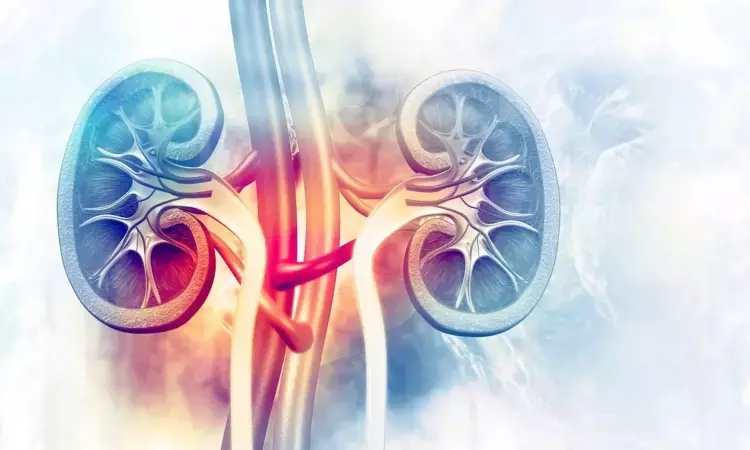- Home
- Medical news & Guidelines
- Anesthesiology
- Cardiology and CTVS
- Critical Care
- Dentistry
- Dermatology
- Diabetes and Endocrinology
- ENT
- Gastroenterology
- Medicine
- Nephrology
- Neurology
- Obstretics-Gynaecology
- Oncology
- Ophthalmology
- Orthopaedics
- Pediatrics-Neonatology
- Psychiatry
- Pulmonology
- Radiology
- Surgery
- Urology
- Laboratory Medicine
- Diet
- Nursing
- Paramedical
- Physiotherapy
- Health news
- Fact Check
- Bone Health Fact Check
- Brain Health Fact Check
- Cancer Related Fact Check
- Child Care Fact Check
- Dental and oral health fact check
- Diabetes and metabolic health fact check
- Diet and Nutrition Fact Check
- Eye and ENT Care Fact Check
- Fitness fact check
- Gut health fact check
- Heart health fact check
- Kidney health fact check
- Medical education fact check
- Men's health fact check
- Respiratory fact check
- Skin and hair care fact check
- Vaccine and Immunization fact check
- Women's health fact check
- AYUSH
- State News
- Andaman and Nicobar Islands
- Andhra Pradesh
- Arunachal Pradesh
- Assam
- Bihar
- Chandigarh
- Chattisgarh
- Dadra and Nagar Haveli
- Daman and Diu
- Delhi
- Goa
- Gujarat
- Haryana
- Himachal Pradesh
- Jammu & Kashmir
- Jharkhand
- Karnataka
- Kerala
- Ladakh
- Lakshadweep
- Madhya Pradesh
- Maharashtra
- Manipur
- Meghalaya
- Mizoram
- Nagaland
- Odisha
- Puducherry
- Punjab
- Rajasthan
- Sikkim
- Tamil Nadu
- Telangana
- Tripura
- Uttar Pradesh
- Uttrakhand
- West Bengal
- Medical Education
- Industry
Nicorandil Reduces contrast-induced nephropathy and Enhances Renal Function in CAG/PCI Patients: Study

Researchers have found in a new study that Nicorandil administration lowers the incidence of contrast-induced nephropathy (CIN) and improves renal biomarkers in patients undergoing coronary angiography (CAG) and percutaneous coronary intervention (PCI). However further large-scale, long-term studies are needed to validate its renoprotective benefits. This study published in the journal of International Urology and Nephrology was conducted by Ahmed Ali Khan and colleagues.
The present study performed a systematic analysis to assess the efficacy and safety of nicorandil, a vasodilator that opens ATP-sensitive potassium channels on decreasing CIN. The analysis summarized data from 12 RCTs comprising 2,931 patients, comparing the effect of nicorandil on CIN occurrence, significant adverse events, and various renal markers like serum creatinine, serum cystatin C, BUN, and eGFR.
Systematic review and meta-analysis using PubMed, MEDLINE, Embase, Google Scholar, and Web of Science up to May 2024 were carried out. It included studies with only randomized controlled trials (RCTs) in patients who had CAG or PCI and took nicorandil.
The examination estimated risk ratios (RRs) and standard mean differences (SMDs) with 95% confidence intervals (CIs), employing a random-effects model for statistical pooling. Statistical heterogeneity across studies was calculated using the I² statistic to ensure credible outcomes.
Key Findings
• CIN Incidence Reduction: Nicorandil reduced the occurrence of CIN by 60% (RR: 0.40; 95% CI: 0.31–0.52; p < 0.00001).
• For oral nicorandil, the reduction in CIN was even more significant (RR: 0.35; 95% CI: 0.25–0.48; p < 0.00001).
• Intravenous nicorandil also decreased the incidence of CIN but to a lesser degree (RR: 0.52; 95% CI: 0.30–0.92; p = 0.02).
• Major Adverse Events Reduction: Oral nicorandil decreased major adverse event risk (RR: 0.71; 95% CI: 0.51–0.99; p = 0.05).
Renal Biomarkers:
• Serum Creatinine: Substantially decreased at 48 hours (SMD: -0.30; 95% CI: -0.52 to -0.07; p = 0.009) and 72 hours after intervention (SMD: -0.42; 95% CI: -0.71 to -0.13; p = 0.004).
• Serum Cystatin C: Substantially lower at 48 hours after intervention (SMD: -0.56; 95% CI: -1.01 to -0.01; p = 0.02).
• eGFR: There was no change of statistical significance at 24 hours (SMD: 0.12; p = 0.46), 48 hours (SMD: 0.08; p = 0.58), or 72 hours (SMD: 0.34; p = 0.16).
The current study offers strong evidence that nicorandil therapy can successfully reduce contrast-induced nephropathy and renal biomarkers in patients undergoing coronary angiography and PCI.
Reference:
Dr Riya Dave has completed dentistry from Gujarat University in 2022. She is a dentist and accomplished medical and scientific writer known for her commitment to bridging the gap between clinical expertise and accessible healthcare information. She has been actively involved in writing blogs related to health and wellness.
Dr Kamal Kant Kohli-MBBS, DTCD- a chest specialist with more than 30 years of practice and a flair for writing clinical articles, Dr Kamal Kant Kohli joined Medical Dialogues as a Chief Editor of Medical News. Besides writing articles, as an editor, he proofreads and verifies all the medical content published on Medical Dialogues including those coming from journals, studies,medical conferences,guidelines etc. Email: drkohli@medicaldialogues.in. Contact no. 011-43720751


